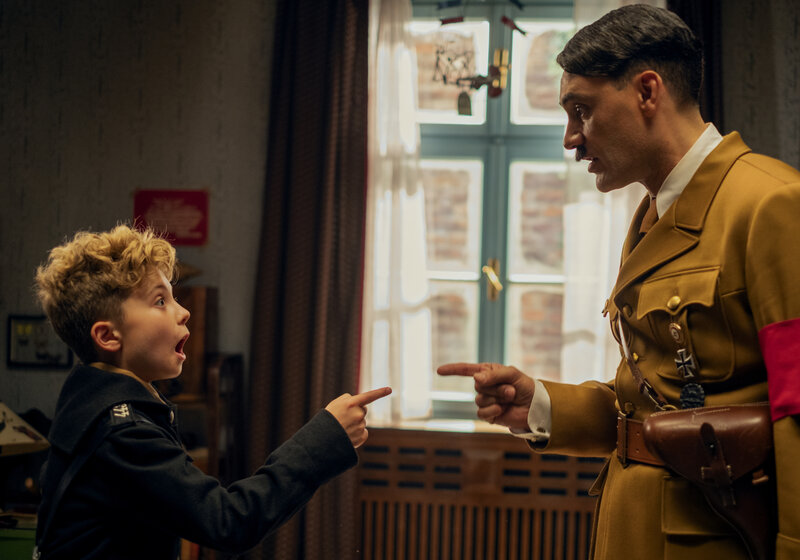We start the year with one of this awards season's more divisive offerings. Back in September, Taika Waititi's Jojo Rabbit won the same People's Choice award at the Toronto Film Festival that Green Book had on its way to winning the Best Picture Oscar, and - not unlike its predecessor - it immediately ran into a fusillade of critical brickbats. It is, unarguably, an idea Waititi could only have hustled into a studio boardroom after making a bundle of money for those suits within the MCU: a wacky "anti-hate satire", based on Christine Leunens' 2004 novel Caging Skies, in which a young boy undergoes a unique coming-of-age in 1930s Germany, with no less a figure than Adolf Hitler as his imaginary friend. In the opening fifteen minutes alone, our protagonist Johannes (Roman Griffin Davis, surely cast for his resemblance to David Bennent's Oskar in Volker Schlöndorff's film of The Tin Drum) is seen being schooled in virulent anti-Semitic propaganda, encouraged to burn books, and - in the incident that earns him the titular nickname - commanded to wring the neck of a cute ickle bunny rabbit. As with the subsequent sequence in which young Jojo is disfigured by a stun grenade, all of the above is played as a joke. Any responsible review would gesture towards the old truth that comedy is the most subjective of artforms, but some especially vocal representatives of Film Twitter would have you know that Jojo Rabbit is a very bad and tragically uncool film to like, and furthermore a deeply naive response to the resurgence of actual Nazism in the contemporary world. I risk excommunication, then, when I say this: I didn't mind Waititi's film unduly.
Jojo Rabbit struck this viewer as an essentially piffling thing: neither the great, wounding satire the moment demands, nor the crime against cinema its detractors insist, but something in between, a film that only those with leisure time enough to spend long nights pounding their socials could possibly get worked up about. My fear - sparked by the awful trailer, resistible even by the standards of modern promo cutting - was that Waititi had once more retreated into the tweeness of 2007's Eagle vs. Shark and 2016's Hunt for the Wilderpeople; the Moonrise Kingdom styling of the Nazi summer camp Jojo attends hardly settled those jitters. Yet the feature proper keeps throwing up odd little chuckles, something like the doodles in the margins that enlivened Waititi's Thor movie. It's Rebel Wilson, as a fully indoctrinated Ilsa of the SS type, declaring "O-M-Gott" upon seeing the boy's injuries; it's the drollness with which Scarlett Johansson, as Jojo's mother, gives her permission to send her ten-year-old off to war; it's a fake letter Jojo pens to dishearten Elsa (Thomasin McKenzie), the Jewish girl living in the family's crawlspace, which purports to come from her sweetheart but concludes on a downbeat note ("P.S. I'm unemployed and quite fat now"). Waititi's imaginary Führer (played by the director himself) is sparingly used, but elicits a laugh upon exiting one scene headfirst out of Jojo's window, and features in a punchline kids of a certain age and sensibility are going to adore, not least because it involves the one instance of swearing in the whole 12A-rated picture. More of that wildness would have been welcome; as it stands, Jojo Rabbit feels a bit too mild for purpose.
There's only as much jeopardy in the film as there is in the average Marvel flick: it's never dangerous enough, either as comedy or counterthreat. After the grenade explodes in his face, Jojo is left with the tiniest, Harry Potterish scar. (We at least needed an insert of the lad with blackened face and hair standing upright.) When Waititi films the lifeless lower bodies of Jewish citizens strung up from lampposts, it results in an oddly flat image, thrown away too early to have the impact it should; the surrounding Nazi flags, colour-corrected to a jaunty Ferrari red, are what pops out at you. Such reassurances ensured the film's status as a late-2019 crowdpleaser, but you feel the studio was only ever willing to sign off on Jojo Rabbit as a PG-13 proposition, which inevitably limits what Waititi can show of the horrors of fascism, and the jokes he can make at its expense. What we get, then, is a cosy sitcom Nazism, an exercise in dress-up that frequently resembles an episode of 'Allo 'Allo shot from a kid's perspective. It would be more amusing if the kids had the chops to sock over the lines Waititi puts in their mouths (in general, they don't), and edgier if Davis posed any real physical threat to McKenzie (but he's a pipsqueak), and therein lies the movie's big limitation - that it's more often cute than funny or lacerating. Setting my own somewhat shrugging reaction aside, I began to wonder what Mel Brooks made of Jojo Rabbit: turns out the answer is "wonderful", according to a throwaway press quote. I suspect the individual blessed with the chutzpah to have arrived at The Producers and recorded "The Hitler Rap" would have appreciated the effort, and that Waititi - a Kiwi with Maori and Jewish heritage - is coming from the right place. Yet I also wonder whether that glib-sounding "wonderful" conceals reservations; whether even Brooks might concede that busting a few goofy, childish moves, which is all Waititi's finally doing here, is - like so many of the Left's responses to the modern world - really too soft to stop a Nazi in their tracks. You need a blunderbuss for that, not a kazoo.
Jojo Rabbit is now playing in cinemas nationwide.

No comments:
Post a Comment